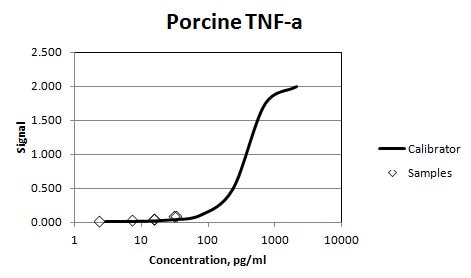Porcine TNF-alpha Antibody Summary
Arg78-Leu232
Accession # P23563
Applications
Porcine TNF-alpha Sandwich Immunoassay
Please Note: Optimal dilutions should be determined by each laboratory for each application. General Protocols are available in the Technical Information section on our website.
Preparation and Storage
- 12 months from date of receipt, -20 to -70 °C as supplied.
- 1 month, 2 to 8 °C under sterile conditions after reconstitution.
- 6 months, -20 to -70 °C under sterile conditions after reconstitution.
Background: TNF-alpha
Tumor necrosis factor alpha (TNF-alpha ), also known as cachectin and TNFSF2, is the prototypic ligand of the TNF superfamily. It is a pleiotropic molecule that plays a central role in inflammation, apoptosis, and immune system development. TNF-alpha is produced by a wide variety of immune and epithelial cell types (1, 2). Porcine TNF-alpha consisits of a 35 amino acid (aa) cytoplasmic domain, a 21 aa transmembrane segment, and a 176 aa extracellular domain (ECD) (3). Within the ECD, porcine TNF-alpha shares 69% - 86% aa sequence identity with bovine, canine, cotton rat, equine, feline, human, mouse, rat, and rhesus TNF-alpha. The 26 kDa type 2 transmembrane protein is assembled intracellularly to form a noncovalently linked homotrimer (4). Ligation of this complex induces reverse signaling that promotes lymphocyte costimulation but diminishes monocyte responsiveness (5). Cleavage of membrane bound TNF-alpha by TACE/ADAM17 releases a 55 kDa soluble trimeric form of TNF-alpha (6, 7). TNF-alpha trimers bind the ubiquitous TNF RI and the hematopoietic cell-restricted TNF RII, both of which are also expressed as homotrimers (1, 8). TNF-alpha regulates lymphoid tissue development through control of apoptosis (2). It also promotes inflammatory responses by inducing the activation of vascular endothelial cells and macrophages (2). TNF-alpha is a key cytokine in the development of several inflammatory disorders (9). It contributes to the development of type 2 diabetes through its effects on insulin resistance and fatty acid metabolism (10, 11).
- Idriss, H.T. and J.H. Naismith (2000) Microsc. Res. Tech. 50:184.
- Hehlgans, T. and K. Pfeffer (2005) Immunology 115:1.
- Pauli, U. et al. (1989) Gene 81:185.
- Tang, P. et al. (1996) Biochemistry 35:8216.
- Eissner G. et al. (2004) Cytokine Growth Factor Rev. 15:353.
- Black, R.A. et al. (1997) Nature 385:729.
- Moss, M.L. et al. (1997) Nature 385:733.
- Loetscher, H. et al. (1991) J. Biol. Chem. 266:18324.
- Clark, I.A. (2007) Cytokine Growth Factor Rev. 18:335.
- Romanatto, T. et al. (2007) Peptides 28:1050.
- Hector, J. et al. (2007) Horm. Metab. Res. 39:250.
Product Datasheets
Citations for Porcine TNF-alpha Antibody
R&D Systems personnel manually curate a database that contains references using R&D Systems products. The data collected includes not only links to publications in PubMed, but also provides information about sample types, species, and experimental conditions.
4
Citations: Showing 1 - 4
Filter your results:
Filter by:
-
The effect of activated protein C on plasma cytokine levels in a porcine model of acute endotoxemia.
Authors: Nielsen JS, Larsson A, Rix T, Nyboe R, Gjedsted J, Krog J, Ledet T, Tonnesen E
Intensive Care Med, 2007-04-25;33(6):1085-93.
Species: Human
Sample Types: Plasma
Applications: ELISA Development -
Simultaneous detection of porcine proinflammatory cytokines using multiplex flow cytometry by the xMAP technology.
Authors: Johannisson A, Jonasson R, Dernfalk J, Jensen-Waern M
Cytometry A, 2006-05-01;69(5):391-5.
Species: Porcine
Sample Types: Serum
Applications: Luminex Development -
Cytokine responses in gnotobiotic pigs after infection with virulent or attenuated human rotavirus.
Authors: Azevedo MS, Yuan L, Pouly S, Gonzales AM, Jeong KI, Nguyen TV, Saif LJ
J. Virol., 2006-01-01;80(1):372-82.
Species: Porcine
Sample Types: Serum
Applications: ELISA Development -
omega -3 PUFA Rich Camelina Oil By-Products Improve the Systemic Metabolism and Spleen Cell Functions in Fattening Pigs
Authors: Ionelia Taranu, Mihail Gras, Gina Cecilia Pistol, Monica Motiu, Daniela E. Marin, Nicoleta Lefter et al.
PLoS ONE
FAQs
No product specific FAQs exist for this product, however you may
View all Antibody FAQsReviews for Porcine TNF-alpha Antibody
Average Rating: 5 (Based on 1 Review)
Have you used Porcine TNF-alpha Antibody?
Submit a review and receive an Amazon gift card.
$25/€18/£15/$25CAN/¥75 Yuan/¥2500 Yen for a review with an image
$10/€7/£6/$10 CAD/¥70 Yuan/¥1110 Yen for a review without an image
Filter by:
The antibody MAB6902 was used as the capture antibody paired withe detection antibody BAM6903 in a sandwich assay for Porcine TNFa. The calibrator was 690-PT. The assay had a sensitivity of 2 pg/ml.














